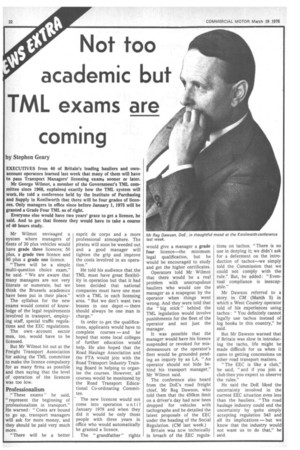Not too academic but TML exams are coming
Page 24

If you've noticed an error in this article please click here to report it so we can fix it.
by Stephen Geary
EXECUTIVES from 40 of Britain's leading hauliers and ownaccount operators learned last week that many of them will have to pass Transport Managers' licensing exams sooner or later.
Mr George Wilmot, a member of the Government's TML committee since 1968, explained exactly how the TML system will work. He told a conference held by the Institute of Purchasing and Supply in Kenilworth that there will be four grades of licences. Only managers in office since before January 1, 1975 will be granted a Grade Four TML as of right.
Everyone else would have two years' grace to get a licence, he said. And to get that licence they would have to take a course of 40 hours study.
Mr Wilmot envisaged a system where managers of fleets of 20 plus vehicles would have grade three licences; 50 phis, a grade two licence and 80 plus a grade one licence.
" There will be a simple multi-question choice exam," he said. "We are aware that many managers are not very literate or numerate, but we think the Brussels academics have been put in their place."
The syllabus for the new exams would consist of knowledge of the legal requirements involved in transport, employing staff, special traffic regulations and the EEC regulations.
The own account sector men, too, would have to be licensed.
But Mr Wilmot hit out at the Freight Transport Association for asking the TML committee to make the licence compulsory for as many firms as possible and then saying that the level of operation of the licences was too low.
Professionalism
"These exams" he said, "represent the beginning of professionalism in transport." He warned : "Costs are bound to go up, transport managers will ask for more money, and they should be paid very much more.
"There will be a better esprit de corps and a more professional atmosphere. The pirates will soon be weeded out and a good manager will tighten the grip and improve the costs involved in an operation."
He told his audience that the TML must have great flexibility in operation but that it had been decided that national companies must have one man with a TML in each licensing area. "But we don't want two bosses in one depot—there should always be one man in charge."
In order to get the qualifications, applicants would have to complete courses — and he hoped that some local colleges of further education would help. He also hoped that the Road Haulage Association and the ETA would join with the Road Transport Industry Training Board in helping to organise the courses. However, all courses would be monitored by the Road Transport Educational Co-ordinating Committee.
The new licences would not come into operation until January 1978 and when they did it would be only those people with three years in office who would automatically be granted a licence.
The " grandfather " rights would give a manager a grade four licence—the minimum legal qualification, but he would be encouraged to study and get the higher certificates.
Operators told Mr Wilmot that there would be a real problem with unscrupulous hauliers who would use the manager as a scapegoat by the operator when things went wrong. And they were told that the 'big stick" behind the TML legislation would involve punishments for the fleet of the operator and not just the manager.
It was possible that the manager would have his licence suspended or revoked for misdemeanours or the operator's fleet would be grounded pending an inquiry by an LA. "An operator should not hide behind his transport manager," Mr Wilmot said.
The conference also heard from the DoE's road freight chief, Mr Reg Dawson, who told them that the 450km limit on a driver's day had now been dropped for vehicles with tachographs and he detailed the latest proposals of the EEC under the heading of the Social Regulation. (CM last week.) Britain was now technically in breach of the EEC regula tions on tachos. "There is no use in denying it; we didn't ask for a deferment on the introduction of tachos—we simply told the Commission that we could not comply with the rule." But, he added: "Eventual compliance is inescapable."
Mr Dawson referred to a story in CM (March 5) in which a West Country operator told of his experiences using tachos : "You definitely cannot legally use tachos instead of log books in this country," he said.
But Mr Dawson warned that if Britain was slow in introducing the tacho, life might be made difficult for us when it came to getting concessions on other road transport matters.
"The EEC is like a club," he said, "and if you join a club then you expect to observe the rules."
He said the DoE liked the uncertainty involved in the current EEC situation even less than the hauliers. "The road haulage industry could end the uncertainty by quite simply accepting regulation 543 and all its implications — but we know that the industry would not want us to do that," he said.








































































































